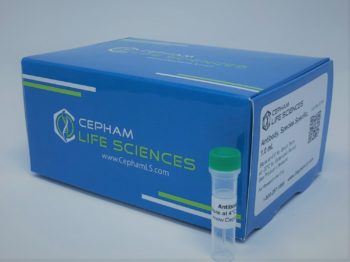Description
Aliases
Stress-activated protein kinase JNK1; c-Jun N-terminal kinase 1; JNK-46
Antibody Type
Polyclonal Antibody
Uniprot ID
Swiss-Prot: P45983 P45984 P53779
NCBI Protein:
Immunogen
Peptide sequence around phosphorylation site of Thr183/Tyr185 (M-M-T(p)-P-Y(p)- V – V ) derived from Human JNK1/JNK2/JNK3.
Raised In
Rabbit
Species Reactivity
Human Mouse Rat
Tested Applications
WB IF Recommended dilution: Predicted MW: 46 54 kd, Western blotting: 1:500~1:1000, Immunofluorescence: 1:100~1:200
Background / Function
Responds to activation by environmental stress and pro-inflammatory cytokines by phosphorylating a number of transcription factors, primarily components of AP-1 such as JUN, JDP2 and ATF2 and thus regulates AP-1 transcriptional activity. In T-cells, JNK1 and JNK2 are required for polarized differentiation of T-helper cells into Th1 cells By similarity. Phosphorylates heat shock factor protein 4 (HSF4). /Responds to activation by environmental stress and pro-inflammatory cytokines by phosphorylating a number of transcription factors, primarily components of AP-1 such as c-Jun and ATF2 and thus regulates AP-1 transcriptional activity. In T-cells, JNK1 and JNK2 are required for polarized differentiation of T-helper cells into Th1 cells. JNK2 isoforms display different binding patterns: a-1 and a-2 preferentially bind to c-Jun, whereas beta-1 and beta-2 bind to ATF2. However, there is no correlation between binding and phosphorylation, which is achieved at about the same efficiency by all isoforms. JUNB is not a substrate for JNK2 a-2, and JUND binds only weakly to it. /Responds to activation by environmental stress and pro-inflammatory cytokines by phosphorylating a number of transcription factors, primarily components of AP-1 such as c-Jun and ATF2 and thus regulates AP-1 transcriptional activity. Required for stress-induced neuronal apoptosis and the pathogenesis of glutamate excitotoxicity Davis, R.J. (1999) Biochem Soc Symp 64, 1-12. Ichijo, H. (1999) Oncogene 18, 6087-93. Kyriakis, J.M. and Avruch, J. (2001) Physiol Rev 81, 807-69.
Conjugate
Unconjugated
Storage Buffer
Supplied at 1.0mg/mL in phosphate buffered saline (without Mg2+ and Ca2+), pH 7.4, 150mM NaCl, 0.02% sodium azide and 50% glycerol.
Form
liquid
Storage
Shipped at 4°C. Upon delivery aliquot and store at -20°C or -80°C. Avoid repeated freeze.
Purity
Antibodies were produced by immunizing rabbits with synthetic phosphopeptide and KLH conjugates. Antibodies were purified by affinity-chromatography using epitope-specific phosphopeptide. Non-phospho specific antibodies were removed by chromatogramphy using non-phosphopeptide.
Modification
Phospho-Thr183/Tyr185
Additional information
| Size | 100?l |
|---|


